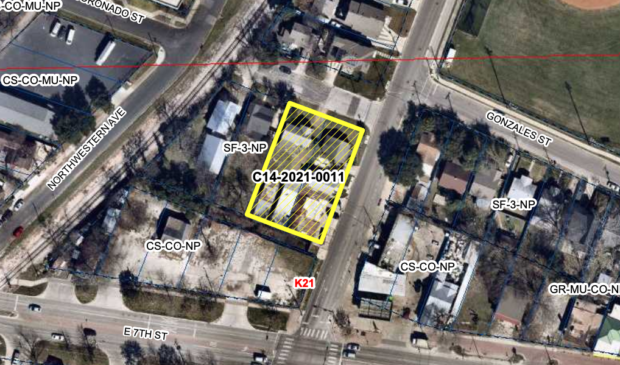Planning Commission gives developer and neighbors more time to break ‘impasse’
Friday, May 14, 2021 by
Jonathan Lee The developers of a small East Austin mixed-use project will have to keep talking it out with concerned neighbors to resolve their differences.
The Planning Commission, after trying and failing to break the “impasse” between the developer and several neighbors, voted to postpone the zoning case until June 8 to give the parties more time to reach an agreement. Micah King, agent for the developer, said that while there have been many conversations since September 2020, they have stalled as of late.
The project is slated for a one-third-acre tract at 712 and 714 Pedernales St. & 2409 Coronado St. in the Govalle neighborhood. The developer requests General Commercial Services-Mixed Use (CS-MU) zoning from the current Family Residence (SF-3) zoning in order to build residential units – 10 percent of which will be affordable – atop a small restaurant. The site is currently occupied by three vacant single-family homes and a defunct auto repair shop.
As is often the case, neighbors had concerns. Most had to do with the types of uses and the proper amount of density that should be allowed off of major corridors – a main point of debate during the Land Development Code rewrite.
The hours of operation for the restaurant space was one of the leading complaints. Neighbor Hudson Baird wants the restaurant to close at 6 p.m., but King wants the restaurant to be able to serve dinner. Baird said nighttime restaurantgoers would disturb families in the nearby residences and “would create a completely different neighborhood character feel.”
King said the developer hopes to attract a restaurant serving food from the Mexican state of Michoacán, in reflection of the developer’s heritage. The project is only one property away from East Seventh Street, a major commercial corridor with many restaurants.
Raul Alvarez of the Govalle/Johnston Terrace Neighborhood Plan Contact Team bemoaned allowing new off-corridor density in the area, a trend he said began with the 2003 Govalle Neighborhood Plan and has only increased since with subsequent transit-oriented development plans.
“Each time, there was more density and no benefit to the neighborhood,” Alvarez said. “We included a lot of density in our (neighborhood) plan where we wanted it, and now everyone is asking to expand where the density can go.”
King argued that the project’s proximity to transit routes and bike facilities is “a great reason to add this zoning and mixed-use designation.” A segment of the Eastlink Trail, which connects the Ann and Roy Butler Hike-and-Bike Trail to the Mueller neighborhood with protected bike lanes, will be built on Pedernales Street.
Urbanist Greg Anderson spoke in favor of the added density and criticized the neighborhood plan. “This is another out-of-date, out-of-touch neighborhood plan from March 2003 when our metro population was just past 1 million and the median price of a home was about $150,000.”
Alvarez said he disagreed with everything Anderson said, calling his comments “myopic.”
“Please don’t dismiss the neighborhood plan, because that’s the vision for the neighborhood as articulated by the neighborhood,” Alvarez said. “We need to value participatory planning and participatory democracy.”
Alvarez also criticized the developer for buying the SF-3 property and then trying to upzone it. “It’s completely speculative,” he said. “They bought it hoping they could change it to commercial, and I don’t think we should reward speculative behavior in our neighborhood.”
Unable to find a zoning recommendation that would resolve the dispute, the commissioners voted unanimously to postpone the case to June 8 in the hope that the developer and neighbors would reach an agreement.
Even so, some commissioners doubted the usefulness of a postponement.
“Is there any evidence that the neighborhood and the applicant are at this stage capable of or interested in reaching an agreement?” Commissioner Joao Paulo Connolly wondered. “Or is the postponement just kind of part and parcel of the philosophy that eternally delaying this is better somehow?”
The Austin Monitor’s work is made possible by donations from the community. Though our reporting covers donors from time to time, we are careful to keep business and editorial efforts separate while maintaining transparency. A complete list of donors is available here, and our code of ethics is explained here.
You're a community leader
And we’re honored you look to us for serious, in-depth news. You know a strong community needs local and dedicated watchdog reporting. We’re here for you and that won’t change. Now will you take the powerful next step and support our nonprofit news organization?








